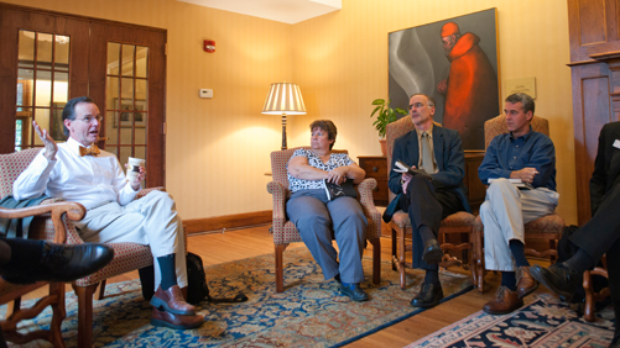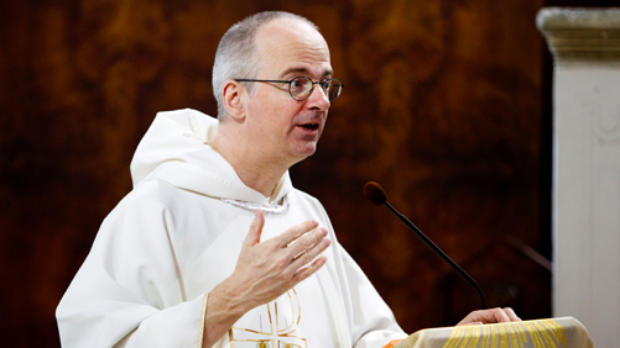The Center for Catholic Studies joined with the Department of Catholic Studies and the Monsignor Jerome D. Quinn Institute of Biblical Studies to co-sponsor the visit of Dr. Gary Anderson, Hesburgh Professor of Catholic Theology and professor of Old Testament at the University of Notre Dame. The Quinn Institute of the Saint Paul Seminary School of Divinity was established to honor Monsignor Quinn’s memory and the high level of biblical scholarship he represented. The Center for Catholic Studies houses three institutes and also enjoys a unique interdependent relationship with the Department of Catholic Studies. These three entities convened to host Anderson for a daylong excursion into the biblical notions of sin and the place of charity within Judaism, Christianity and Islam.
Dr. Anderson met with graduate students of the Master of Arts in Theology program and the Catholic Studies Master of Arts program for a book discussion. The students had been given a copy of Anderson’s book Sin: A History over the summer, and they met with Anderson to enjoy lunch, theological discussion and camaraderie between the twograduate programs.
Kyle Sellnow, a current Master of Arts in Theology candidate, who completed a major in Catholic Studies as an undergraduate, enjoyed meeting other graduate students with a decidedly intellectual focus. “Meeting Dr. Anderson with students from both graduate programs was a bona fide delight. Both the Catholic Studies Masters program and the School of Divinity did well to capitalize on the opportunity to collaborate in disclosing Dr. Anderson’s work Sin: A History to students. Across the graduate landscape, we were able to renew our desire to understand Scripture in a manner that takes due regard both for sound scholarship and the genuine expression of the Catholic faith.”
Catholic Studies Master of Arts candidate, Mary Jane O’Brien also found the pre-lecture conversation extremely helpful on an academic level. “Dr. Anderson was genuinelyapproachable and willing to engage us on any topic presented, whether asked to explain how the idea for his book developed, what the process of research and writing involved, or even which previous course work led to his current work and interests. This type of discussion is invaluable for graduate students.”
Following the student luncheon, Anderson met with professors from a variety of departments for another discussion. Twenty faculty members from the departments of theology, philosophy, history, English and Catholic Studies and members of the Saint Paul Seminary School of Divinity faculty engaged in a roundtable discussion in Sitzmann Hall. Paul Niskanen, associate professor of theology remarked, “The book discussionwith Gary Anderson was simply delightful. It brought together an unusually eclectic array of colleagues from St. Thomas, and I was impressed with the breadth of Professor Anderson’s scholarship in his ability to engage such a diverse group. Seldom have I seen so many specialists in other fields interested in chatting with a biblical scholar. The discussion challenged me to consider more carefully what I do, looking at the life of a text not only in its original cultural matrix but against the broader horizons of its history of interpretation and its contributions to the development of literature and theology.”
David Foote, associate professor of history commented on the depth and breadth of the discussion, “What most fascinated me about the discussion was the way in which it highlighted the great potential in Catholic scholarship. Professor Anderson’s work approached the data in his field of research – in this case Hebrew and Aramaic philology –with utter seriousness and an enviable level of skill. Yet he brought to the data a breadth of vision that made his work relevant far beyond the boundaries of his own discipline. The discussion was, at one and the same time, about Old Testament philology, New Testament studies, medieval history, theology, anthropology and economics. This struck me as a model of the Catholic intellectual life – a way of seeing that does not lose the forest for the trees.”Anderson himself enjoyed the cross-discipline faculty discussions. “It was a marvelous discussion and one that I greatly profited from. My book covers a number of differentacademic disciplines, and my thesis was pressed and deepened by the comments of the various scholars who were present. Of special concern during the discussion was thestatus of the metaphorical language we find in the Bible and the challenge to deploy it constructively in our common theological task.”
The Center for Catholic Studies also collaborated on a number of other lectures this past fall (see below).
The Gary Anderson lecture, “Sin: A History” can be found on the Center for Catholic Studies website: www.stthomas.edu/cathstudies/programs/ccslectures.
Other lectures at the Center for Catholic Studies
All lectures may viewed at www.stthomas.edu/cathstudies/programs/ccslectures unless otherwise noted.
Dr. Anthony Esolen, Sept. 19, 2011Sponsored by the Center for Catholic Studies
Dr. Anthony Esolen, professor of English at Providence College, spoke on the idea of “culture” and the relationship it holds with Catholicism. His engaging lecture highlighted the current state of culture and the need for its revitalization, including the recollection of our religious history, public displays of popular religious practices and a return to the study of classic literature.
Father Michael Keating, Oct. 12, 2011Thought and Culture Lecture Series Sponsored by the Catholic Studies Master of Arts program and the Center for Catholic Studies
Father Keating, associate professor of Catholic Studies, addressed a large audience to the relevance and lessons of English historian Christopher Dawson in a lecture titled “Why Dawson Matters.” Father Keating subtitled his lecture “Five Reasons to Read Christopher Dawson.” Dawson was noted for his exploration of the history of culture and of the nexus between human cultures and their religions. He was undoubtedly a major figure in the intellectual landscape of England and America during the middle of the last century, but one still might ask whether he has any particular continuing relevance for today. Keating argued that the answer to that question is a resounding yes; that many of Dawson’s key insights are as important for us now as they were when he first wrote them.
Dr. David LubanHuman Dignity Lecture Series Sponsored by the Terrence J. Murphy Institute for Catholic Thought, Law and Public Policy
Dr. David Luban, professor of law and philosophy at Georgetown University, is the acting director of the Center on National Security and the Law. His lecture, “A Critique of Human Dignity as Autonomy,” began by reviewing the problems faced by religious and metaphysical accounts of human dignity, and then turned to its principal target: the identification of human dignity with autonomy. Luban argued that autonomy is not a self-standing value but rather a surrogate for other values, which had little to do with human dignity. He engaged the Stoic and Kantian ideal of autonomy as self-legislation and suggested that it grounds human dignity in the culturally embedded image of the statesman/legislator as the most dignified of beings. He also included feminist notions of interpersonal relationships. Taken in sum, these ideas led to a more relational conception of humanity as opposed to dignity based solely on autonomy. There was also an interdisciplinary seminar at the Law School following Luban’s remarks.The lecture may be view at www.stthomas.edu/murphyinstitute.
Father Erich Rutten, Terry Nichols and Hans Gustafson, Oct. 25, 2011Sponsored by the Center for Catholic Studies, Muslin-Christian Dialogue Center and Jay Phillips Center for Interfaith Learning
Father Erich Rutten, director of Campus Ministry, Terry Nichols, co-director of UST’s Muslim-Christian Dialogue Center, and Hans Gustafson, assistant director of the Jay Phillips Center for Interfaith Learning, discussed the significance of interreligious dialogue for Catholics and the anniversary of the World Day of Prayer in Assisi. Their talk highlighted the necessity for Catholics to engage in dialogue with people of other faiths.
Mr. Jason Evert, Nov. 8, 2011Sponsored by the Center for Catholic Studies, Campus Ministry and the Archdiocese of St. Paul and Minneapolis
Mr. Evert spoke on dating relationships, specifically the benefits of chastity. He earned a master’s degree in theology and undergraduate degrees in counseling and theology with a minor in philosophy at Franciscan University of Steubenville.
Read more from Perspectives







